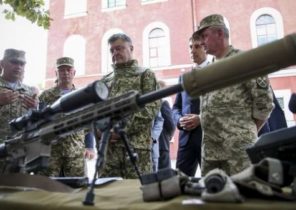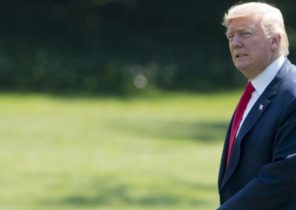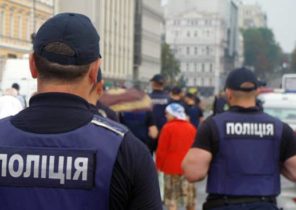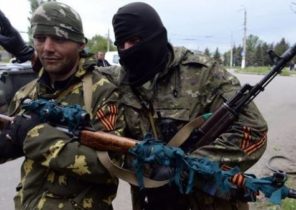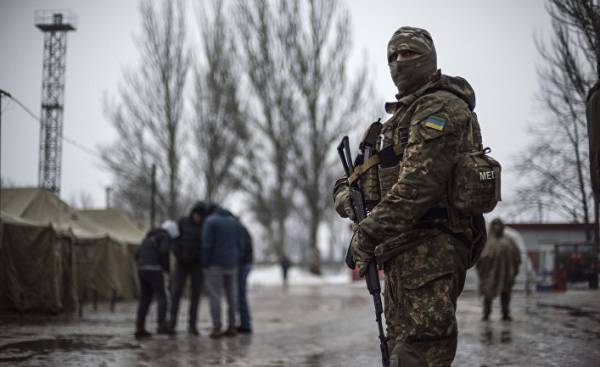
While Americans painfully ponder the significance of Russian intervention in the us presidential elections in 2016 and that it was not a mutually beneficial agreement between the headquarters of the trump and the Russian government, Russian soldiers continue to kill Ukrainians in Donbas. Lasting three years and claimed 10 thousand lives in the conflict in Ukraine today does not attract the attention of the American media, if there is no connection with the trump. But although the killing in Donbass today seem commonplace, but Americans are focused on Russia’s intervention in the Affairs of their country (which is absolutely correct), the United States can’t afford to lose sight of the continuing military and political campaign of the Kremlin to destabilize Ukraine and to bring to power in Kiev Pro-Russian government. Ukrainian foreign Minister Pavlo Klimkin undoubtedly informed last week the Secretary of state’s Rex Tillerson about the latest features of this campaign.
In fact, there is a correlation between Russian aggression in Ukraine and its interference in American elections. Russian attempts to bring to the White house more agreeable figure was partly intended to achieve from the new us administration refusing to support Ukraine. I spoke in the framework of their professional duties with Russian Ambassador Sergei Kislyak, and it is during this communication sharply criticized the US for supporting a democratic government in Kiev. Kislyak and other officials from the Russian government often say that because of the fall of the former corrupt government headed by Viktor Yanukovych vital interests were under threat and that the United States should stay away from Ukraine.
Ukraine is important for USA not because of any significant economic or military interests. Its significance is that Russia has invaded the neighboring country and attempted to Annex part of its territory, which is contrary to the basic principles of international law such as respect for the sovereignty and territorial integrity of countries and inviolability of borders. When these principles are violated by brute force, and no one is opposed to such blatant actions, Russia has intensified expansionist ambitions and claims to adjacent territory, and other countries of the world, seeing such an example, begin to think about achieving the same revanchist goals by force.
For these reasons, the experts on national security from the current administration needs to develop a coherent strategy to support the sovereignty and territorial integrity of Ukraine. It would need to dramatically change your beliefs and overcome his fear. The administration needs to forget about the possible agreement of the headquarters of the trump on how to throw Ukraine under the train (even given the fact that the former head of this staff by Paul Manafort previously worked on the thieves ‘ regime of Yanukovych). This case is to engage an independent special Prosecutor. Officials of the national security system in the White house, state Department and Pentagon should not be distracted by these issues because they need to develop policies that will prevent Russia to achieve its goals in Ukraine. For a start they should focus on the following six questions.
1. The new administration must continue to work to strengthen the Ukrainian defense from Russian aggression. Launched in 2016, Obama program for the training and equipping of the armed forces of Ukraine in the amount of 335 million dollars is a good start from which to start further work. The military training, which is carried out with the Ukrainians, British, canadian, Lithuanian and American military, have significantly enhanced their combat potential, giving them the skills and means to repel attacks like the deadly offensive in the town at the end of January. Losing a few dozen people, Ukrainian troops still defended the plant and reflected the joint offensive of the Russians and the separatists. The Ukrainian military on the front line at that time was taught by American instructors.
The new administration should expand the program of combat training, over time, to include the skills of combined arms combat (this will be a qualitative leap in training), and in addition, to provide Ukraine with defensive weapons and military equipment. This includes anti-tank missiles and counter-battery radar with a fire control system that will allow the Ukrainian military to strike at military positions of the enemy artillery. The main part of Ukrainian casualties from Russian jet systems of volley fire, mortars and mobile artillery. Therefore, the United States and other NATO countries should provide Ukraine with means of defense against these deadly weapons, many of which indiscriminately cause the loss of both military and civilian populations.
Some argue that if we arm Ukraine, Russia will go to the escalation of the conflict and that defensive weapons will not change the balance of forces on the battlefield in favor of Ukraine, as Moscow has enormous superiority in firepower. But Russian and separatist troops in this case would be much harder to attack and capture new areas of territory that they tried to do in the town because of the loss they will be much more. For the Russian General staff, the refusal of NATO to arm the Ukraine is a much more serious provocation than the provision of defensive weapons.
2. US should connect directly to diplomatic efforts to resolve the conflict. At the initial stage of the crisis, the United States and the European Union to have discussions directly with Russian and Ukrainian representatives. However, French President Francois Hollande and German Chancellor Angela Merkel pushed US in the direction of the diplomatic process, denying Barack Obama to participate in a meeting with Russian President Vladimir Putin and Ukrainian leader Poroshenko in Normandy in June 2014, which marked the beginning of the so-called Normandy format (France, Germany, Ukraine and Russia). In the absence of U.S. members of the Quartet in February 2015, agreed to the ill-defined Minsk Protocol, which makes the role of the Russian stooges in the negotiations has increased, and Moscow got the pretext to block the Minsk agreements.
These puppets got a place at the negotiating table and participated in the discussion of the practical aspects of the implementation of the Minsk Protocol, including provision of access to OSCE observers on the entire territory of Donbas and withdrawal of heavy weapons. Thus, the February-2015 agreement allowed Moscow to shift the responsibility on Pro-Russian separatists fighting in Eastern Ukraine. Predictably, two years after the signing of the Minsk agreements no progress in Donbas is not reached. After the invasion of Georgia in 2008, Moscow took a clever game by initiating international negotiations in Geneva. The Kremlin is well aware that the appearance of negotiations allows you to retain the status quo, and the actions of his local henchmen give Moscow the opportunity to absolve themselves of all responsibility. The United States needs to connect directly to the negotiation process, to change such dynamics.
3. The resolution of the conflict is impossible without the strengthening of pressure on Russia. Admittedly, this is no easy task. Russia wants to control the government in Kiev and are ready to engage in the long game, investing heavily in achieving their goals. While sanctions cause definite damage to the Russian economy, Moscow certainly took a bet that over time it through various means of bribery will be able to have an effect on European leaders (and American), and those deserting, abandoning the existing consensus. Therefore, the U.S. should maximize pressure on Russia, which they need to weaken or strengthen the sanctions, depending on its behavior. To coordinate the sanctions regime is quite difficult, because it requires the interaction of the EU and the United States, and the decision-making process in the EU is slow and cumbersome. Moreover, unilateral us sanctions against the exploitation of energy resources and the military-industrial complex, will be ineffective without the participation of the EU, as European companies will simply take the contracts from which refuse their American competitors. But the financial sanctions are easier to adjust and are less dependent on the respective European measures. Further, there is significant potential to strengthen existing financial sanctions. Today, the United States entered a “blocking sanctions” (sanctions, stopping all financial transactions of the company) against only one Russian Bank, which is not even ranked among the top twenty largest financial institutions in Russia. Consequently, the unilateral U.S. financial sanctions should be considered as a tool to create incentives for the implementation of the Minsk agreements.
4. It is necessary to change the time frame. Currently, Russia is a long game, without renouncing military options and at the same time experimenting with political Subversion, where she is as tools use corruption and oligarchs. Sanctions and low oil prices harm Russian economy, but their effect is gradual and cumulative. This is enough to affect decisions about the next steps of Russia, but not enough to question the performance of the entire mission. Therefore, the administration should work with France and Germany to create a road map for the implementation of the Minsk Protocol and very specifically state what steps and in what sequence should do.
Although signed in September 2014 and February 2015 Minsk agreement is far from perfect, their key position to advance and to reestablish authority over Ukraine’s Donbass. But for the successful implementation of these agreements Minsk road map should be tied to a specific schedule. For example, Western leaders should insist that Russia withdraw its troops from the contact line by a specific date. Now this requirement is no Statute, and therefore Russian separatist and Ukrainian troops continue to sit in the trenches, sometimes less than 100 metres from the demarcation line. When the troops depart from the line of contact, OSCE observation mission should be authorized and the opportunity at any time to check whether the withdrawn heavy weapons from these areas, and this drainage should also be carried out by a specific date. Currently there is no specific timetable for the withdrawal of heavy weapons and OSCE observers work only in the daytime. It is unlikely this contributes to reliable demilitarization. If there is a strict implementation schedule of the Minsk agreements, Russia will face negative consequences for non-compliance, mostly in the form of tougher sanctions. Today, due to the lack of specific deadlines and punitive measures for non-compliance there is a dangerous status quo, while Moscow might be tempted to wait out Western sanctions. After all, Putin has been in power for 17 years, and he has seen a lot of Western leaders who came and went. Maybe he thinks need a little patience, and then the Western consensus on the issue of sanctions will weaken.
5. The new administration should continue to contribute to the success of Ukraine. The Obama administration has paid great attention to this country, and Vice President Joe Biden regularly communicated with the Ukrainian leadership. The Obama administration also has put forward some conditions for assistance to force the Ukrainian leaders to implement difficult but necessary reforms. The new administration will provide Ukraine a disservice (and obviously will help Russian interests), if will be a policy of connivance. Although in Ukraine there is an active civil society, and the government and Parliament are working strong reformers, there are also people remaining from the former system, who continue to cash in on deep-rooted corruption. At the insistence of the States in the country were created by powerful institutions in the fight against endemic corruption, including National anti-corruption Bureau and National Agency for prevention of corruption. But a weak judicial system and clan groups in the bureaucracy continue to wage a brutal struggle against these new institutions, absolutely knowing that those able to change the entire system. Only with consistent pressure and vigilance of the West will be to ensure that the Ukrainian law enforcement agencies began to carry out their duties properly.
6. The new administration should insist that Europe actively supported the democratic development of Ukraine. European countries simply do not have on Ukraine proper pressure to implement reforms, and do not put it the appropriate conditions for assistance, as do the United States and the international monetary Fund. Europe will benefit from Ukraine’s success and the most to lose from its failure, and so she had to give up their disturbing passivity. European ambassadors in Kiev it is time to leave your familiar and comfortable environment where they write a telegram to their capitals and give speeches about the need for further reforms. Of course, Ukraine in recent years has made tremendous progress. But to move forward, it requires a coordinated and proactive promotion of American and European leaders. Only they can help Ukraine to continue reforms to strengthen its democratic institutions and enhance the defense capability to protect sovereignty and territorial integrity.
For the future of European security and the liberal international order the international community should make it so that when the Kremlin leaders ten years from now will analyze the results of the Russian occupation of Ukraine, they will realize that it was a strategic blunder, by which Ukraine is irrevocably embarked on the path of rapprochement with the West and the construction of a liberal democracy.
